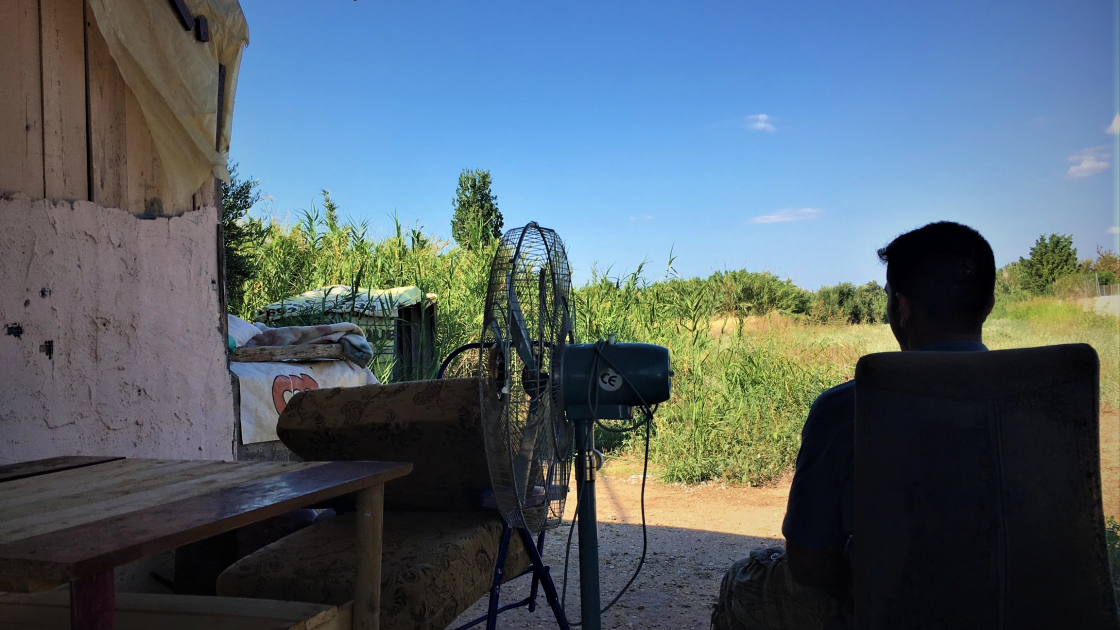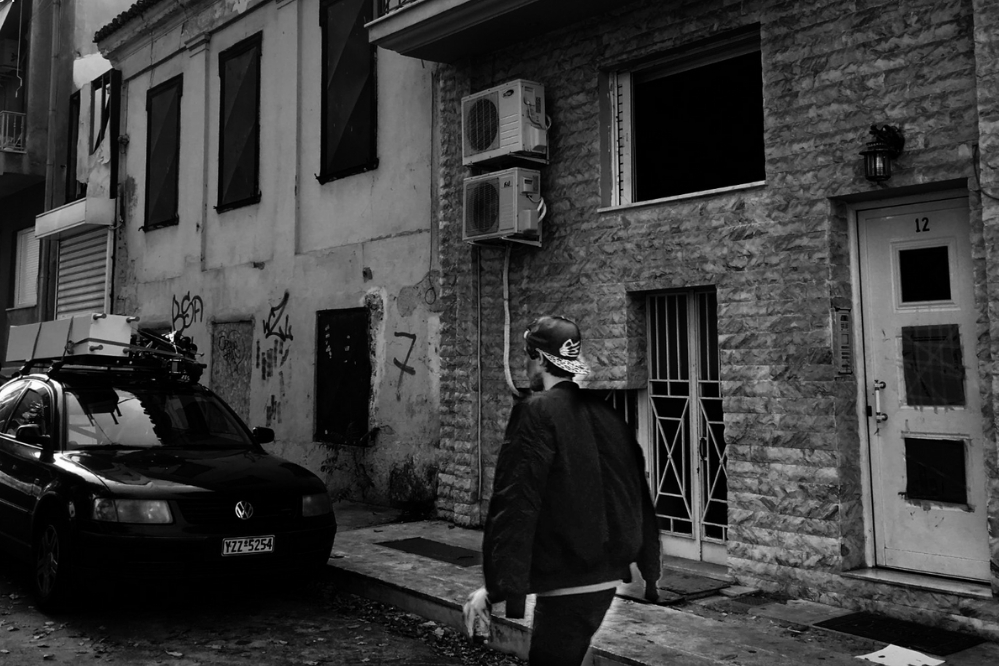
During the height of Greece’s refugee crisis in 2016, sixteen-year-old Shehzad* was locked in the unaccompanied children’s section of Moria refugee camp on Greece’s Lesvos island. Unlike many of the Syrian and Afghan children who fled their homes in search of safety, Shehzad had not arrived in Greece to escape war and violence. Shehzad had dreams of playing cricket for England.
The teenager had run away from home and traveled over 5,000 kilometers with a smuggler after hearing stories from his friends in the city of Mandi Bahauddin in eastern Punjab province. Like him, they had left Pakistan and had invited Shehzad to join them in Europe. “I got wrapped up in plans with my friends back home,” said Shehzad with a twinge of regret. “Some of them were already in France.”
Originally, Shehzad assumed he could stay in France for a short period before traveling to England, but his father said no. ”He said I was his only child and he couldn’t let me go.”
Shehzad was nevertheless determined to travel to Europe, so he ran away. In Greece, Pakistani adolescents like Shehzad are the second-largest group of unaccompanied minors seeking asylum, behind only Afghans. The majority of these boys are between 14 and 17 years old. Many Pakistani boys do not come from areas affected by political turmoil or violence. Like Shehzad, most come from cities and villages of Punjab, nestled in dense migrant networks that have developed over multiple generations.
Pakistani adolescents are the second-largest group of unaccompanied minors seeking asylum in Greece, behind only Afghans.
“These boys see how their relatives or their neighbors’ relatives who live in Europe send so much money back home (to Pakistan),” said Muhammad, who looks at child protection at the Network for Children’s Rights in Athens. “But things were different when those men traveled. Yes, they traveled illegally, but it was possible for them to obtain legal status in some European countries or to open up businesses and eventually achieve some level of economic success. That is really not possible anymore.”
For decades, Greece has played a major role as a host and transit country for Pakistani migrants in Europe. After the September 11 attacks heightened global airport security, Pakistanis unable to acquire a visa saw a new opportunity through over-land transcontinental smuggling routes across Balochistan, Iran and Turkey. Smugglers typically took migrants as far as Greece, where they attempted to repay smugglers’ fees by working in the agricultural fields or the black market. Previously, migrant youth entering the country undocumented were afforded several protections and rights under Greece’s 2001 Law on Aliens, but today this path is no longer available.
Asylum applications filed by Pakistanis in Greece are only accepted at a 2% rate
Instead, since the spike in irregular migration to Greece’s Aegean islands in 2015-2016, underaged boys who land on Greek shores are often immediately taken to migrant reception centers. These young migrants can only maintain a presence in Europe by applying for asylum. However, the likelihood of asylum success is dismal—asylum applications filed by Pakistanis in Greece are only accepted at a rate of 2.4%. Still, the sluggish processing rate can buy most Pakistani boys a few years of time, allowing them to remain in the country, albeit in a painful legal limbo.

“Danki Lagana”
“I believed what the agent (smuggler) said,” recalled Shehzad. “He said we would be traveling by car and that we might have to walk for two or three hours at a time. But we walked on foot for two or three days at a time, over mountains and across rivers, surviving only on biscuits and water. They even put us in the trunks of cars—once for a whole 24 hours.”
While Shehzad was surprised by how harrowing his journey to Greece was, many of his peers harbored a better idea of the road ahead of them. Among Pakistani teenagers, the journey to Europe is known as danki lagana, because “you walk along like a donkey. You walk for days and days,” Shehzad explained.
The families of Pakistani child migrants are typically aware of the perils that lie along smugglers’ routes to Europe and are reluctant to let their children go. Yet, their families are unable to counter the lure of omnipresent smuggling agents and the stories of successful migrants with iPhones and new cars. Unlike adult asylum seekers, smugglers agree to take minors on the journey without advance payments, allowing boys to leave without their family’s support. Once they are in Iran or Turkey, however, the boys are held as hostages in musafirkhanas, or smugglers’ safehouses, at least until the families can raise enough money to pay the smuggler’s fees.
“My journey from Pakistan to Turkey was only eighteen days, but in Turkey, they held me for six months,” said Shehzad. Faced with a ransom, his father eventually relented and paid the sum of money demanded by smugglers.
“The smugglers know that the boys’ families have assets,” explained Muhammad. “At the very least, they own animals that they can sell.”
The cost of travelling undocumented from Pakistan to Greece can cost approximately 6,000 euros, portions of which leave Pakistan’s economy to pay smugglers in Iran and Turkey. It is not uncommon for families to go into debt to cover smugglers’ fees, typically by borrowing money from friends and family and selling familial property or jewelry.
“If you’re a parent and you find out your son is held hostage in another country, what else can you do?” said Muhammad. “Of course, you will sell everything.”
Even when their prospects in Europe seem bleak, most Pakistani boys refuse to return to their home country.
“Better to Go Home“
Once unaccompanied Pakistani minors arrive in Greece, they quickly face pressure to earn an income to help pay back the costs of their journey, chase dreams of economic success, or simply to survive. However, child labor is a crime in Greece, so the only places for these adolescent boys to work are informal sectors, such as agriculture, or in black market economies selling illicit drugs.
“I had never done farm labor before,” said 17-year-old Imran*, also from Pakistan’s Punjab province. “But I had nothing to eat, nowhere to live. A Bangladeshi man in Athens offered me a job selling untaxed cigarettes (do number cigarette), but I don’t smoke, so I didn’t take that job. That’s why I came to the strawberry farm.”
Labor managers on Greek farms hire undocumented migrant labor at exploitative rates, deducting costs of food and housing from workers’ pay, or withholding weeks of paychecks altogether.
Yet, meager pay and backbreaking labor are not the only things unaccompanied children are exposed to on Greek farms.
“Of course there is sexual exploitation on the farms,” said Muhammad. His clients included Pakistani minors who had run away from agricultural jobs. “You have minors living in packed sheds with twenty, thirty adult men. Labor contractors sometimes keep a child for themselves, usually the youngest. The boys don’t dare to tell their families about it. And when the farm laborers are drinking and doing other drugs, the boys do it too. What else can they do? They have nowhere else to go.”
Although there are children’s shelters available for unaccompanied minors in Greece, they only have enough capacity for roughly half of the 4,000 or so unaccompanied minors who need assistance each month, leading to long wait lists. Many Pakistani boys run away from shelters to find work, and even those who stay remain segregated from Greek society.
“Social workers are overworked, and there is no one to teach these kids technical skills or the Greek language,” Muhammad said. “Even after they turn 18, they are not able to participate in the Greek economy.”
The only option available to these boys, even in early adulthood, is to work in immigrant-dominated agricultural fields or the drug or sex trade, where they face a grave risk of exploitation.
Even when their prospects in Europe seem bleak, most Pakistani boys refuse to return to their home country.
“What will I do if I go back?” said Imran. “I have not finished school, I won’t be able to get a job. Right now, work is difficult, but I am able to help pay for my sister’s wedding.”
Too ashamed to return home empty-handed and unsure of how to start a new life if they were to return, Pakistani youth continue to toil in Greece, facing homelessness, sexual and labor exploitation, and social isolation. The journeys also exert a heavy toll on their mental health. Depression and anxiety are prevalent among unaccompanied migrant boys, and self-harm behaviors are commonplace. Many boys self-medicate with drugs and alcohol, which are easily available in Athens.
The long-term consequences are dire, yielding poor outcomes in adulthood the longer they face social isolation and mental distress. The longer unaccompanied migrant children remain homeless, trapped in musafirkhanas, or otherwise cut off from mainstream society, the more they miss out on crucial developmental and learning experiences. This ultimately makes it more difficult for them to reintegrate into society in adulthood, and destines them to a future of suffering as part of Europe’s undocumented underclass.
“For many of them, it would be better to return home,” said Muhammad. “But they stay on in the hope that something will change.”
*Note: All names of children have been changed to protect their identity.












